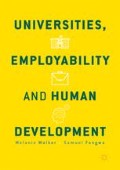Abstract
In this chapter, we explore employer perceptions of recent graduates from South African universities. We first consider opportunities for graduates from different universities, based on employers’ stated preferences. We look at what employers want in the graduates they recruit and how satisfied they say they are, locating this in relation to socio-economic conditions of inequality and uneven graduate ‘capitals’ in order to analyse whether graduate employment opportunities re-inforce or fracture the inequalities of access and participation in university education. We base our analysis on 17 major employers (15 private and 2 public) with whom we conducted telephone interviews and a third public-sector employer who finally agreed to complete a questionnaire based on the interview schedule. We spoke to key persons responsible for graduate employment and training after appropriate clearance was obtained and the purpose of the research clearly communicated. Sectors included construction, mining, banking, financial and investment services, retail, manufacturing, transport and supply chain companies.
Access this chapter
Tax calculation will be finalised at checkout
Purchases are for personal use only
Notes
- 1.
Varsity College was founded around 20 years ago, as the higher education sector of the Independent Institute of Education (IIE), the largest accredited private education provider in the country. There are eight campuses nationwide offering tuition support for a variety of higher education degrees, diplomas and higher certificates, including the UK Open University (OU). Pass rates are good: the national average pass rate was 80 per cent, with 24 per cent of students who passed achieving distinctions. The drop-out rate is 16 per cent compared to the national average for all higher education institutions of over 30 per cent. See https://www.varsitycollege.co.za/.
References
Bhorat, H., Visser, M., & Mayet, N. (2010). Student graduation, labour market destinations and employment earnings. In M. Letseka, M. Cosser, M. Brier, & M. Visser (Eds.), Student retention and graduate destination: Higher education and labour market access. Pretoria: Human Sciences Research Council.
Bourdieu, P., & Boltanski, L. (1978). Changes in social structure and changes in demand for education. London: Methuen.
Burke, C. (2016). Culture, capitals and graduate futures. London and New York: Routledge.
Calitz, T. (2016). A capabilities approach to student experiences of pedagogy, power and well-being at a South African university. Unpublished PhD dissertation. Bloemfontein: University of the Free State.
CHEC. (2013). Pathways from university to work: Abridged report. Wynberg: CHEC.
Chisholm, L. (2015). Why education and skills alone can’t create growth and end unemployment: An essay review. Journal of Educational Change, 19(1), 208–222.
Conradie, I., & Robeyns, I. (2013). Aspirations and human development interventions. Journal of Human Development and Capabilities, 14(4), 559–580.
Forrester, V. (1999). The economic horror. Cambridge: Polity Press.
Gasper, D., & Van Staveren, I. (2003). Development as freedom – and as what else? Feminist Econ, 9(2), 137–161.
Griesel, H., & Parker, B. (2009). Graduate attributes: A baseline study of South African graduates from the perspective of employers. Pretoria: South African Qualification Authority and Higher Education South Africa.
Hlongwane, S., 2012. Dear jobless graduate: Is it really your fault? http://www.dailymaverick.co.za/…/2012-06-25-dear-jobless-graduate-is-it-really-your-fault/. Accessed 21 July 2016.
Morley, L. (2001). Producing new workers; Quality, equality and employability in higher education. Quality In Higher Education, 7(2), 131–138.
Nussbaum, M. (1997). Cultivating humanity. A classical defence of reform in liberal education. Cambridge, MA: Harvard University Press.
Oluwajodu, F., Blaauw, D., Greyling, L., & Kleynhans, E. P. J. (2015). Graduate unemployment in South Africa: Perspectives from the banking sector. SA. Journal of Human Resource Management, 1(1), Art. #656, 9. http://dx.doi.org/10.4102/sajhrm.v13i1.656. Accessed 1 July 2016.
South African Graduate Recruitment Association (SAGRA). (2013). The SAGRA employer survey 2013. London: High Fliers Research Ltd.
Walker, M. (forthcoming). Aspirations and equality in higher education: Gender in a South African University. Cambridge Journal of Education. http://dx.doi.org/10.1080/0305764X.2016.1254159.
Walker, M., & Loots, S. (2016). Social citizenship formation at university: A South African case study. Compare, 46(1), 48–68.
Author information
Authors and Affiliations
Copyright information
© 2017 The Author(s)
About this chapter
Cite this chapter
Walker, M., Fongwa, S. (2017). Employers and Graduate Opportunities. In: Universities, Employability and Human Development. Palgrave Macmillan, London. https://doi.org/10.1057/978-1-137-58452-6_7
Download citation
DOI: https://doi.org/10.1057/978-1-137-58452-6_7
Published:
Publisher Name: Palgrave Macmillan, London
Print ISBN: 978-1-137-58451-9
Online ISBN: 978-1-137-58452-6
eBook Packages: EducationEducation (R0)

